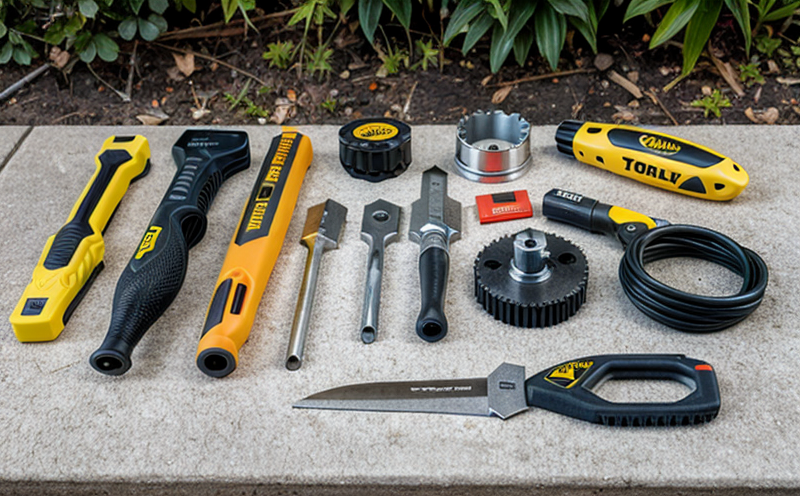Thermal Cycling Testing of Power Tools
In today’s fast-paced world, consumer electronics and DIY tools have become indispensable. However, these products are often subjected to extreme environmental conditions that can affect their performance and longevity. To ensure reliability and safety in such environments, it is crucial to subject them to thermal cycling testing. This process simulates the temperature variations found in real-world usage scenarios, ensuring that power tools maintain optimal functionality under fluctuating temperatures.
Thermal cycling tests are particularly important for DIY tools as they are often used in a variety of environments. These tools may experience exposure to high and low temperatures during use, storage, or transportation. For instance, a cordless drill might be stored in a hot garage or operated outdoors on a cold day. The goal of thermal cycling testing is to verify that the power tool can withstand these temperature extremes without compromising its performance.
The test typically involves exposing the specimen (the power tool) to a series of controlled temperature cycles, with each cycle consisting of a specific duration at both high and low temperatures. This process helps determine how well the tool can handle thermal stress and whether it is likely to fail due to material fatigue or other issues.
During these tests, it is essential to consider not only the operational parameters but also the environmental factors that could impact the tool’s performance. For example, the test may include exposure to relative humidity levels that are common in certain regions. The results of such testing provide valuable insights into the durability and reliability of power tools under real-world conditions.
The importance of thermal cycling testing extends beyond just ensuring compliance with industry standards; it also helps manufacturers identify potential weaknesses in their products early on, allowing for improvements before product release. By performing these tests, companies can enhance customer satisfaction by delivering more robust and dependable tools that meet the highest safety and quality standards.
Scope and Methodology
| Test Parameters | Description |
|---|---|
| Temperature Range | -40°C to +85°C (standard range) |
| Dwell Time | Each temperature point is held for 2 hours. |
| Cycle Duration | Total cycle duration is approximately 96 hours, depending on the number of cycles required. |
| Relative Humidity | 5% to 98% RH (optional but recommended). |
The testing process begins with thorough preparation of the specimen. The power tool is cleaned and inspected for any initial defects or issues that could affect the results. Once prepared, the tool undergoes a series of temperature cycles in an environmental chamber. During each cycle, the tool is exposed to high temperatures for two hours followed by low temperatures for another two hours. This process simulates real-world conditions where power tools might be used in hot and cold environments.
After completing all the required cycles, the tool undergoes a series of functional tests to assess its performance after exposure to these thermal extremes. These tests may include measuring voltage output, checking for any signs of wear or damage, and ensuring that all operational functions are still intact. The results of these tests provide critical data on the tool’s durability and reliability under varying temperature conditions.
The methodology used in thermal cycling testing is based on international standards such as ASTM F1383-05(2020) which specifies requirements for laboratory test methods to evaluate the effects of cyclic temperature changes. Compliance with these standards ensures that the testing process is consistent and reliable, providing accurate results that can be trusted by manufacturers and regulators alike.
Eurolab Advantages
At Eurolab, we pride ourselves on offering comprehensive and high-quality thermal cycling testing services for power tools. Our state-of-the-art facilities and experienced technical staff ensure that each test is conducted with precision and accuracy.
- Accurate Testing: Our laboratories are equipped with the latest environmental chambers capable of maintaining precise temperature control within the required ranges.
- Comprehensive Reports: We provide detailed reports outlining all test parameters, results, and recommendations for improvement. These reports are invaluable tools for manufacturers in optimizing their products.
- Experienced Staff: Our team consists of highly trained professionals who have extensive experience in conducting thermal cycling tests on various types of power tools.
- Comprehensive Coverage: We cater to a wide range of clients, from small startups to large corporations. Whether you need testing for a single product or an entire line, Eurolab can accommodate your needs.
Choosing Eurolab means choosing a partner committed to excellence in quality assurance and compliance. Our commitment to delivering accurate and reliable results has earned us a reputation as one of the leading laboratories in the industry. Trust Eurolab for all your thermal cycling testing requirements, and you will be assured of top-notch service and support.
Customer Impact and Satisfaction
The benefits of undergoing thermal cycling testing are far-reaching and impact both manufacturers and consumers positively. For manufacturers, the primary advantage lies in identifying potential weaknesses early on in the development process. This allows for timely corrections and improvements before product release, resulting in higher quality products that meet or exceed industry standards.
From a consumer perspective, these tests ensure greater reliability and longevity of power tools. Knowing that your tool has been subjected to rigorous testing can give you peace of mind knowing it will perform as expected under various conditions. This increased trust between manufacturers and consumers fosters stronger relationships and enhances overall customer satisfaction.
Moreover, compliance with relevant industry standards is crucial for market entry in many countries. By ensuring that your products pass thermal cycling tests, you not only enhance their performance but also facilitate easier access to international markets.





